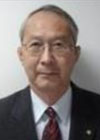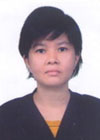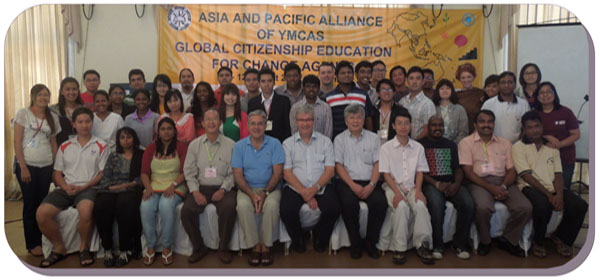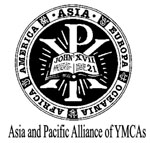|

From the Desk of the General Secretary
Today I would like to share with you about the group of retired secretaries and their activities in Japan. As part of the preparation for the 100th Anniversary of the Japan YMCA in 2003, the retired secretaries were asked to write the history book on 100 years of YMCAs in Japan. They formed a group then to fur-ther study and find out the important steps in the his-tory of the country’s various YMCAs.
That group formed a voluntary association of “YMCA Archives Japan” in the process of writing the history. Since then, some volunteers have come to the NCYJ office once a week to study and organ-ize the important historical documents and pictures at the small YMCA history library (Archives). They meet four to five times a year for presentation of their findings. Presentations were done by particular themes, such as YMCA camps, schools, particular programs, particular YMCAs, or fraternal secretaries from overseas. All the presentations were recorded and the newsletter is issued to share with YMCA related people to read.
Here I would like to introduce a presentation which was given in May 2012 by Mr. Minoru Saito, a for-mer secretary of the Tokyo YMCA. The theme of his study was “Era 1940 in Japan”. The World War II ended in 1945 and 1940 was the year that all the country prepared for the coming war with full ener-gy. The author mentioned that 1940 was the time the government changed and shifted every part of the country into readiness to win the war. The Japanese military government sent troops to various countries in Asia. Everything seemed to be controlled and peo-ple were forced to agree and promote the policies for the victory of Japan. At the same time, all Christian communities, including many churches and YMCAs, were strongly influenced without questions among themselves. Every individual, every association in-cluding YMCA had to cooperate with the Japanese Government which was totally military controlled.
His study appealed that during the war, the YMCA also became a supporter and promoter of the Japa-nese military government. Then after the war, he said he could not find any article in YMCA newsletters about how the YMCA regretted or had made mistakes in the last ten years of wartime. Instead, most of the articles spoke about and promoted how we should all build up a new Japan and democracy. He pointed out one speech he found in the archives, written by a lead-ing secretary of Tokyo YMCA in 1946. It said, “we all felt today how come we, Japan have taken the wrong path?” He continued, “with this regret, we have real-ized that we need to learn much more about the Bible”. “We all were led into a wrong path including us Chris-tians”. “We might make the same mistakes in the fu-ture”. Mr. Saito mentioned that this is the only article he found speaking about our mistaken path after the war.
In the conclusion, Mr. Saito said, “We all need to learn from our history for learning and assuring why we, the YMCA, exist. We need to think and question our path in the past and at present from learning our history.”
KOHEI YAMADA

APAY New Staff
We welcome our new staff, Ms. Liem Hwee Ming, Program Of-ficer, Alternative Tourism & Youth Empowerment. Earlier she worked at the YMCA of Solo, YMCA of Salatiga and at YMCA of Solo, Indonesia. Later she joined Ecumenical Coalition on Third World Tourism (ECTWT) as an Assistant Secretary in Hong Kong worked for 2 years. From 2007, she has been working as a volun-teer coordinator and reporter for Youth Work Camp in YMCA of Yogyakarta.
Liem Hwee Ming was educated at Satya Wacana Christian University, a Graduate in English. Besides, she has studied Chinese Language in Jinan Universi-ty, Guangzhou, China & worked in Hong Kong. She is acquainted with Chinese Language. We hope she enjoys her time here in the APAY.
Global Citizenship Education for Change Agents
6-12 August 2012, Sri Lanka

The Asia and Pacific Alliance of YMCAs gathered a total of thirty seven (37) participants from 13 coun-tries: Australia, Bangladesh, Cambodia, Hongkong, Indonesia, India, Japan, Myanmar, Malaysia, Philip-pines, Singapore, Sri Lanka and Thailand. There were six (6) members of the Youth Participation and Lead-ership Committee (YPLD), twenty (20) Youth Reps, seven (7) other youth participants and four (4) offic-ers from the Asia and Pacific Alliance office.
 The program started with ex-pectations setting, warm up games and team building activities to get to know each other and develop closer working relationship. It was followed immediately by input on leadership which was summed up as follows: KMF, which means, ‘Keep Moving Forward’; S P A R K, which means: S- Speak with candor, choosing our language as it forms character; P- prioritize; A- adversity bridge opportunity; R- responding; K- kodus, an act of grati-tude, always be grateful. Another acronym from the session was: H U M A N which means: Helpfulness; Understanding – taking the lowest position to under-stand others; Mingle – interact with people; A- amuse, to see amusement as a leader can let you listen; and N- nurture. The program started with ex-pectations setting, warm up games and team building activities to get to know each other and develop closer working relationship. It was followed immediately by input on leadership which was summed up as follows: KMF, which means, ‘Keep Moving Forward’; S P A R K, which means: S- Speak with candor, choosing our language as it forms character; P- prioritize; A- adversity bridge opportunity; R- responding; K- kodus, an act of grati-tude, always be grateful. Another acronym from the session was: H U M A N which means: Helpfulness; Understanding – taking the lowest position to under-stand others; Mingle – interact with people; A- amuse, to see amusement as a leader can let you listen; and N- nurture.
Immediately after the opening worship was a day for input sessions. Mr. Kohei Yamada started it by providing the quadrennial program plan on Empower-ing Young People to be the Change agents in the Asia and Pacific Region and other program plans for Change Agents and Youth Empowerment in Action.
The World Alliance Change Model concept and frame-work was then presented by Jose Varghese and how the Asia and Pacific Alliance can actively participate and adopt its components as it relates to its own con-text.
For the next session on Understanding realities, dy-namics and social processes in global socio-cultural and political aspects in societies with Prof. Tex Gabo, the participants were requested to sit in their respective groups. The session started with reading the “Hope for the Flowers” as a reflective group activity. Sharing from the groups’ reflections was given by members from each group. These reflections were then connect-ed to the definition of globalization and how power relations interplay in the economic, political and cul-tural life of a society.
 The process of how marginaliza-tion of people happens was il-lustrated and the question was asked how and in what ways the YMCA can play a role in bringing back the people into the mainstream global reality while being in soli-darity with them through the promotion of global citi-zenship education. This was followed by preparing the participants for the community exposure by providing guidelines on how to relate and interact with the local people, know and understand their situ-ation without making them feel being intruded. Spe-cific orientation on the areas was then provided by Mr. Thoumyan, a youth leader of the National Coun-cil of Sri Lanka and a former member of the YPLD Committee of the Asia and Pacific Alliance of YMCAs. The process of how marginaliza-tion of people happens was il-lustrated and the question was asked how and in what ways the YMCA can play a role in bringing back the people into the mainstream global reality while being in soli-darity with them through the promotion of global citi-zenship education. This was followed by preparing the participants for the community exposure by providing guidelines on how to relate and interact with the local people, know and understand their situ-ation without making them feel being intruded. Spe-cific orientation on the areas was then provided by Mr. Thoumyan, a youth leader of the National Coun-cil of Sri Lanka and a former member of the YPLD Committee of the Asia and Pacific Alliance of YMCAs.
The last day of the ‘GCE for Change Agents’ was a dialogue with the Secretary General of the World Alliance. He profoundly presented and discussed the vision of a NEW WAY which has clarified many of the questions from the participants. Yamada san pro-vided a brief on APAY’s expectations from Youth Reps and their respective roles at local, national and regional levels. Jose Varghese provided an overview on how the Global Citizenship became a focus of the APAY region, and why there is need to further un-derstand it and to promote actions through education. vision of a NEW WAY which has clarified many of the questions from the participants. Yamada san pro-vided a brief on APAY’s expectations from Youth Reps and their respective roles at local, national and regional levels. Jose Varghese provided an overview on how the Global Citizenship became a focus of the APAY region, and why there is need to further un-derstand it and to promote actions through education.
The event in Sri Lanka was also memorable and fun-filled being highlighted by the celebration of the Golden Anniversary of the founding of the National Council of the YMCAs of Sri Lanka.
ELOISA DUKHA BORREO
Change Agents Training Team Conference 2012
Long Beach, California, USA
1. Introduction:
The Change Agents Trainers Team consisting of rep-resentatives from seven (7) area alliances in the World Alliance (Sonia Rusugu, Kenya, Eloisa Borreo, Philippines, MargothRoldan, Columbia, Ida Thomas, Canada, Gerard Tosserams, The Netherland, Bob Cabeza, USA and Romulo Dantas, Brazil) , met on July 26- 30, 2012. Their tasks were to finalize the pro-posed curriculum for change agents program of the World Alliance; to detail each area’s ability to carry out the trainings; and, on the global level, to discuss possibilities/opportunities for both the 2013 Prague Festival and 2014 World Council, and to learn and communicate the “Welcome to Change” message.
2. Program and Process
The first day of coming together was to get to know each other and the host YMCA of Longbeach, Cali-fornia Institute and their program. After the informal introductions, the staff of the youth institute intro-duced themselves and the work they do in the pro-gram they dubbed as Change Agent Productions. “Creating change, creating quality, creating the fu-ture” is the slogan they chose to provide youths with developing opportunities from the most challenged communities. They have been trained to be profes-sionals in their visual language and share their gained skills, teaching corporate skills to youth from the un-derrepresented populations. All the profits from this program go back to the community and fund their Youth Institute digital arts program.
We had the whole day interacting with many of the youths participating in the program, listening to their personal stories, their lives, struggles and hopes since this YMCA program started helping them to build their future. We, as a team, later gave our reflections on their sharing.

3. CATT Agenda
As the group went through the re-orientation process to understand what this “Welcome to Change” is all about, and through reviews and discussions, the fol-lowing agreements were arrived at:
-
All the components of the curriculum will be de-livered on area level in order to achieve more depth and Prague will be focusing on adding a world perspective to all topics of the curriculum and creating an opportunity for interaction among change agents through the festival;
-
CATT will act as the front line facilitators and presenters of the YMCA Change model and over-all “Welcome to Change” message during the area level trainings. Romulo will provide the standard presentation.
-
CATT will meet regularly for updates and discus-sion as a group and will have side meetings with World Alliance in order to work on the specific issues of an area/national movement;
-
All contents of the training will be available in the internet via learning platform, webinars and read-ings.
Proposed Program Curriculum in Prague Festival, August 4-10, 2012
Goals:
-
Change Agents will develop a cohesive and dy-namic world team of leaders;
-
Change Agents will enhance their leadership skills through presentations, storytelling, sharing infor-mation and dialogue;
-
Change Agents will gain knowledge on global issues and how they relate to youth empower-ment;
-
Change Agents will gain a better understanding of their role in implementing the change model to waken up the sleeping giant.
-
Change Agents will understand their roles and responsibilities at the World council 2014.
Program Components:
Day 1 – (3 hours) Bonding Session and Orientation
Storytelling: The focus will be on looking for stories that can exemplify the YMCA Change Model of SPACE/TRANSFORMATION/IMPACT
Activity 2- Networking with Smart outcomes: while collecting stories, the change agents will also focus on building connections with festival participants in order to strengthen their personal network and foster collab-oration for further projects on the institutional change process. Prague is an opportunity to connect.
Day 2 – (2 hours) Global Citizenship / Global Awareness – To educate on different realities, to foster respect and solidarity.
This will be done through groups discussion.
Day 3 – (2 hours) The Change Agents Role
The perception of their mission as change agents and how existing good practices on personal and institu-tional levels can support their work.
Day 4 – Service Learning Day (2 hours)
Day 5 –(2 hours) World Council Preparations
ELOISA DUKHA BORREO
Updates on 30th Advanced Studies Programe
This year 14 participants from the YMCAs of Bang-ladesh, Cambodia, China, Hong Kong, India, Japan, Korea, Myanmar, Malaysia, Philippines and Sri Lanka will join 30th Advanced Studies Program (ASP). This training program for YMCA profession-als will be held from 5 November to 30 November 2012 in Hong Kong. We welcome them all.
Youth Participation and Leadership Development
“Close to my heart”
 When I was four or five years old, I used to go to Birisiri YMCA Free Primary School (my local YMCA) to play with the children. I noticed the children had no shoes or slippers and wore torn school-dresses. I wanted to help them with the things they needed. It made my parents surprised when I showed interest to go to school and wanted to share my clothes and slippers with the children. It was the first time to have someone sharing those necessary things with them! It was the starting of feelings to help poor people. When I was four or five years old, I used to go to Birisiri YMCA Free Primary School (my local YMCA) to play with the children. I noticed the children had no shoes or slippers and wore torn school-dresses. I wanted to help them with the things they needed. It made my parents surprised when I showed interest to go to school and wanted to share my clothes and slippers with the children. It was the first time to have someone sharing those necessary things with them! It was the starting of feelings to help poor people.
In a pre-Christmas program of YMCA, I performed a solo dance for the first time and learnt that art can be an inspiration to people. Later, I attended YMCA Annual Youth Seminar, Cultural Exchange Programs of YMCA where I found my real friends. After joining Birisiri YMCA as a volunteer, I got chance to represent Bangladesh to APAY, International Youth Forum and World Council of YMCA in 2010. This opportunity opened my eyes with a spirit to know the family of YMCA all over the world. It had a profound impact on studies and in making important decisions of my life. Working for the youth to bond relations between generations, I find it my responsibility to inform and help people on legal aid matters and make themselves aware for their rights. This brings satisfaction and happiness to me. YMCA gave me a platform, care and environment to build my leadership quality. YMCA showed me a path of opportunity to enrich my creativity, motivation with sincerity, strong commitment, good communication ability, organizational skill, innovation, work in a team environment and cultural standard. I have learned to accept both failure and success, practiced compassion & love with positive attitude. YMCA always encourages me with spirit to walk a thousand miles to ensure justice, peace, living with dignity along with the rights before I sleep.
Balmi Chisim Tora
Bangladesh
 It is a powerful tool to empower youths to become the next generation of leaders who seek to create positive changes in the society. Therefore what it really means to me is the beginning of a miracle to come. A time where the youths of the world can really see the change that they want to. A time where the youths today are united regardless of nationality, race or religion. It would be amazing to break all barriers and start seeking transformation. It is a powerful tool to empower youths to become the next generation of leaders who seek to create positive changes in the society. Therefore what it really means to me is the beginning of a miracle to come. A time where the youths of the world can really see the change that they want to. A time where the youths today are united regardless of nationality, race or religion. It would be amazing to break all barriers and start seeking transformation.
Wayne Tan Wei En
National Youth Representatives
Change Agents from Singapore
 Global Citizenship means many many small steps of change, to me. With every small step we are going to move forward, we will bring the diversity of YMCAs around the world, collectively and progressively, towards the common goal and refreshed identity for Youth Empowerment. GCE training for Change Agents in Sri Lanka is the start of our journey! Global Citizenship means many many small steps of change, to me. With every small step we are going to move forward, we will bring the diversity of YMCAs around the world, collectively and progressively, towards the common goal and refreshed identity for Youth Empowerment. GCE training for Change Agents in Sri Lanka is the start of our journey!
Alvin Kan
YPLD Chairperson
Change Agent from Hong Kong
An Update on APAY
Global Alternative Tourism Network
The Task Force of Global Alternative Tourism Network (GATN) formed at the Executive Com-mittee Meetings of APAY during March 2012 took in hand the task of process of initiating the GATN Program in the APAY. The Support Groups formed at the International Alternative Tourism Forum held in November 2011, in Cam-bodia, was reorganized recently. The reconstituted Support Groups are for (i) Code of Ethics (ii) Cer-tification and (iii) Marketing. Each of the Sub Committees had put all their efforts to accomplish their responsibilities at the shortest time possible. They met on several occasions. We are glad to inform that we have already achieved some results in our work. In short, these are (i) the identifica-tion of 10 Alternative Tourism Sites, (ii) Develop the Code of Ethics of Alternative Tourism, (iii) Fix Criteria of Certification of the Alternative Tourism sites. (v) Processing of four Alternative Tourism Proposals for Certifications. We have received Alternative Tourism proposals from YMCAs of Chiangmai (Thailand), Pangasinan (Philippines), Yellagiri & Gaya (India). Proposals of Komari YMCA, Sri Lanka, Birisiri YMCA, Bangladesh and Cambodia YMCA are on anvil.
We have already hosted the GATN Website, pres-ently running on experimental basis, this will be solely used for the promotion and marketing of GATN. We are on the process of preparing a GATN manual, which will act like a guideline for adopting the Alternative Tourism activities in the YMCAs in our region. A Planning Meeting of the GATN Task Force is being held on Bangkok dur-ing 31 August to 2 September 2012 were we shall be finalizing our plan of action for the next three years. Ms. Liem Hwee Ming from Indonesia YMCA shall be joining as Program Officer for GATN from 1st of September, 2012, we hope that her joining shall expedite our work in this field.
With great hope we envisage that the APAY Global Alternative Tourism Network shall be able to work independently within a time span of three years, ful-ly engaged in the promotion of AT not only for the YMCAs who are involved in this field but also oth-ers organizations who are working for the promo-tion of AT.
GATN shall engage itself with other networks de-voted for the cause of AT, committed for upholding the values of communities and its people, the GATN also pledges itself to work towards reducing of the relentless plundering of nature and ecology caused by traditional mass tourism.
GATN looks forward to be transformed to an inde-pendent setup with necessary human resources with-in a reasonable time under the auspices of APAY, able to mobilize the necessary resources for its oper-ation.
DUNCAN CHOWDHURY

|









